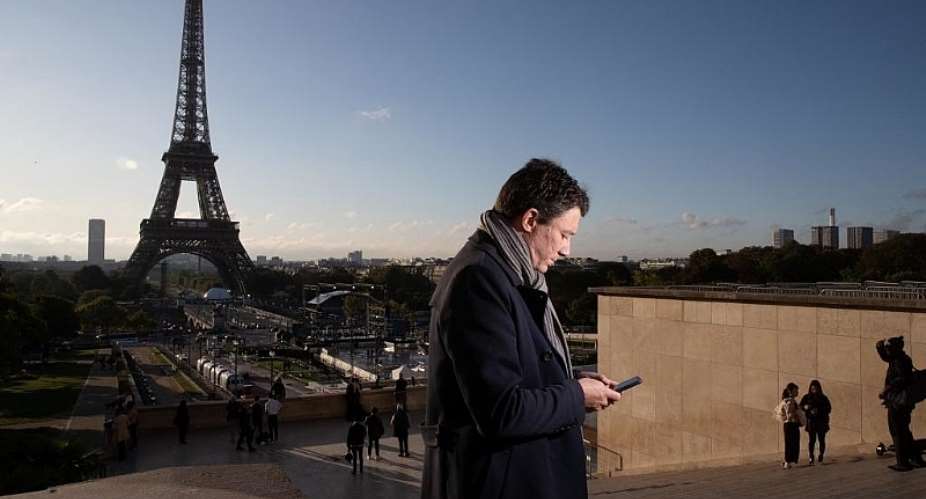French leaders from across the political spectrum have called for private life to be respected after the release of a sex tape led to the resignation of Paris city hall hopeful Benjamin Griveaux. But Griveaux's withdrawal from the race is also a major blow to Macron's bid to control City Hall.
Leaders of France's main parties took to social media Friday to denounce the lynching of Benjamin Griveaux who resigned as LREM candidate to become mayor of Paris after a website published an explicit sex video, which it said came from the former government spokesman.
According to Liberation newspaper, the video was put online by Russian performance artist Pyotr Pavlensky who became famous for nailing his scrotum to Red Square.
Pavelensky claimed to have put the video online to expose the ex-candidate's “hypocrisy” over his stance on family values.
He said he got the video from a “source” who had a consensual relationship with 42-year old Griveaux, married with three children.
Griveaux's political rivals rallied around him on Friday.
“Let us refuse this flood of voyeurism in French public life,” Jean-Luc Melenchon, the head of hard-left France Unbowed party tweeted, describing the publication of “intimate images [designed] to destroy a rival” as “odious”.
“Some blows are not allowed,” he added and called on his party faithful “not to take part in a settling of scores”.
Socialist Mayor Anne Hidalgo, who is leading the race in opinion polls, called for "the respect of privacy and of people."
Dissident candidate Cédric Villani, who left LREM to run against Griveaux, called the attack “undignified" and a “serious threat to our democracy”.
Green candidate David Belliard meanwhile “noted this difficult decision" and said “the respect for private life was a fundamental right which shouldn't be called into question by any public engagement”.
Stanislas Guérini, LREM's general delegate, thanked Griveaux for “putting group [interests] before himself,” following “hideous attacks” which are “not worthy of our democracy”.
The fall from grace
Griveaux began in local politics and rose up in the ranks of former Socialist minister and disgraced head of the IMF Dominique Strass Kahn (DSK).
He worked as an adviser to DSK and supported the latter's unsuccessful bid to lead the Socialist Party in 2006.
His career took off in 2015 when he was asked to help create Emmanuel Macron's En Marche! Movement.
Seen as one of Macron's closest political allies, he was appointed government spokesman following Macron's election in May 2017 and also worked as Secretary of State at the Finance and Economy ministry.
He had a frank style which some, even within his party, called arrogant.
In January 2019 he had to escape his office after Yellow Vest protestors rammed a truck into his ministry.
Shortly after being named as LREM candidate in Paris Mayor elections, his image took a blow when a recording of him insulting several of his colleagues was made public.
His campaign “Paris together with Benjamin” failed to generate much enthusiasm and he was mocked on social media for planning to move Gare de l'Est and create a Parisian “Central Park” in its place.
Recent polls showed him trailing in third place in Paris, where Macron had won comfortably in the 2017 presidential elections.
Blow for Macron
Griveaux has said LREM's project for Paris would continue “better without [him]” adding that “Parisians deserve a dignified campaign”.
LREM are meeting Friday to plan a new strategy for the party.
It's far from clear whether it could rally round dissident Cédric Villani or field another candidate.
But there is little doubt the Griveaux scandal is a blow to Macron's ambition to retake control of Paris city hall.
While Griveaux had never been a frontrunner in the campaign, there were hopes a good score in Paris would help consolidate Macron's base ahead of his re-election bid in 2022.
In the upcoming local elections on 15 and 22 March, LREM risks facing heavy losses in rural areas where Macron's policies have met with resistance and fired the “Yellow Vest” protest movement.
It was hoped a decent performance in the capital would offset those anticipated losses.
Macron's ruling party meanwhile is losing support.
Three MPs defected in early February, leaving the party with 300 members in the National Assembly, down from 314 at the start of its term.
Recent opinion polls suggest less than a third of the French now view Macron favourably.





 Saglemi Housing Project will not be left to rot – Kojo Oppong Nkrumah
Saglemi Housing Project will not be left to rot – Kojo Oppong Nkrumah
 Transport fares hike: GPRTU issue two-day ultimatum
Transport fares hike: GPRTU issue two-day ultimatum
 ARC endorses Alan as presidential candidate – Buaben Asamoa
ARC endorses Alan as presidential candidate – Buaben Asamoa
 Akufo-Addo appoints Kwasi Agyei as new Controller and Accountant-General
Akufo-Addo appoints Kwasi Agyei as new Controller and Accountant-General
 PNC dismiss reports of mass resignations
PNC dismiss reports of mass resignations
 PAC advocates for revenue collectors to be engaged on commission basis, not full...
PAC advocates for revenue collectors to be engaged on commission basis, not full...
 Genser Energy commissions 110km of natural gas pipeline at Anwomaso
Genser Energy commissions 110km of natural gas pipeline at Anwomaso
 Naa Torshie calls for tolerance, peace ahead of 2024 election
Naa Torshie calls for tolerance, peace ahead of 2024 election
 Asantehene commends Matthew Opoku Prempeh for conceiving GENSER Kumasi Pipeline ...
Asantehene commends Matthew Opoku Prempeh for conceiving GENSER Kumasi Pipeline ...
 Let’s do away with ‘slash and burn politics’ in Ghana — Dr Adutwum
Let’s do away with ‘slash and burn politics’ in Ghana — Dr Adutwum
